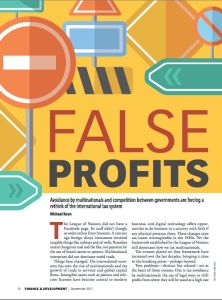Join getAbstract to access the summary!

Join getAbstract to access the summary!
Michael Keen
False Profits
Avoidance by multinationals and competition between governments are forcing a rethink of the international tax system
IMF, 2017
What's inside?
Multinationals have an arsenal of ways to lower their tax bills and shift profits to tax havens.
Recommendation
The tax foundation for companies that operate globally remains fairly similar to what it was a century ago, despite fluid tax borders created by digital technology and the growth of intangible assets such as patents and licenses. This timely report from fiscal expert Michael Keen illustrates the twin problems of “tax avoidance” and “tax competition” in a radically transforming global economy. getAbstract recommends this instructive article to corporate executives, government officials and others interested in the potentially harmful effects of tax shopping by multinationals.
Summary
About the Author
Michael Keen is a deputy director of fiscal affairs at the International Monetary Fund.



















Comment on this summary